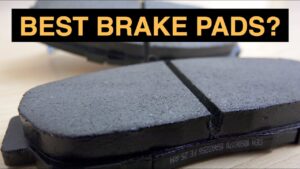Let’s think about the five most important parts in your car or any vehicle for that matter. One of them is of course the brakes, right? Imagine having to drive a vehicle without brakes! Brakes give you the trump card to stop or slow down your vehicle according to the situation and save you from many situations that otherwise would have been an accident.
Since brakes are the safety devices of your vehicle, it is important to maintain them very well and reach out to a mechanic when it feels like your brake needs maintenance. You should also have a clear idea about how often should you change your brakes to make sure that it is in good condition. Otherwise, due to lack of maintenance, your usual saviors will let you down and you and your vehicle will be prone to accidents!
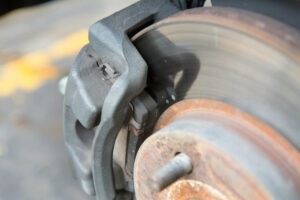
Table of Contents
How Often Should You Change Your Brakes?
The simple answer to this question is to change the brakes whenever they are worn out. So you should change them as often as many times as your brakes take to wear out. Driving with faulty brakes is a threat to your life and your car’s so it is always better to be careful and take your vehicle for frequent maintenance
In this article, we will be going through all the details that cause your brakes to wear and how to identify them. This will help you determine how often should you change your car brakes
What Are Brakes And How Do They Work?
Before going into further details regarding the topic, let’s briefly look at what brakes are. Your car generally will have two types of brakes namely disc brakes and drum brakes. Both these brakes use friction to stop the vehicle.
- Disc brakes: These brakes consist of pads made of specifically engineered organic, ceramic or metallic substances that are pressed against a disc or a rotor when you apply the brakes.
- Drum brakes: These brakes are also mostly like the disc brakes but the disc is replaced by a half-moon-shaped shoe that gets pressed against the inside of the drum when you apply the brakes.
Thus when you apply brakes, the pressing of the discs and drums causes friction, forcing the vehicle to slow down or stop. Thus there is no doubt that brakes play a vital role in keeping you and your vehicle safe.
Factors That Determine Brake Change Frequency
The wearing of brakes and their several components like brake pads, brake caliper, and brake rotor varies from vehicle to vehicle and depends on their use. Here are some of the factors that lead to the wearing of your breaks
1. Driving Habits
This is something most people are unaware of, but pushing the brakes hard can determine how long your brakes will last.
2. Environment
In some situations like while driving on a busy road or while riding downhill, you’d have to apply breaks consistently or more often than while driving on a long straight road with no traffic. If you are someone who has to take the former mentioned type of rods often, the use of brakes will be a lot and this will wear the brakes out quickly.
3. Overheating
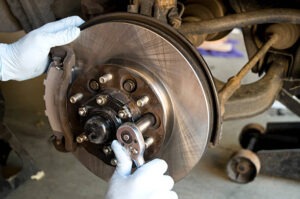
In case of extreme driving, the friction in the brakes will instill them to overheat. This will result in the pads melting onto the rotors which will wear out the brakes thus making them perform poorly.
4. Materials
The materials that are used to make your brakes play a huge role in determining how often you have to change your brakes. For example, Carbon ceramic brakes are found to last longer than their metallic counterparts but the former is too expensive and is mostly only found in sports and other high-performance cars.
When Should I Change The Brakes?
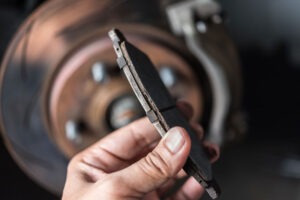
All the above-mentioned factors will slowly wear out your brake pads and if your mechanic says that your brake pad lining is now in the 3 mm to 4 mm range, you should know that it is time for you to change it.
The standard thickness of a new brake lining is about 12 mm. With time, your vehicle’s brake will start wearing, reducing the thickness of the lining. When the thickness starts going less than 6 mm, your brakes will start showing some signs which we will discuss a bit later. When your brakes start showing signs, take them to your car’s mechanic as soon as possible and get them changed. On average it is advised for you to change your brakes every 40,000 to 50,000 miles but these numbers can also differ for each vehicle depending on the driving conditions and other factors.
Symptoms of Faulty Brakes
The answer to how often should you change your brakes lies within your vehicle itself. Your brakes and your car will start showing different symptoms that will help you understand that it’s time for you to replace your old brakes with new ones. Some of the signs are
1. Squeaking Or Squealing
The first symptom that you will notice if your break is coming to an end, is the constant squeaking and squealing it makes. This happens when your vehicle’s brake pads have completely worn out and are now grinding against the rotor. This noise can come either if you are breaking or not
2. Vibration When Braking
Another sign that shows it’s time to change your brakes is the vibration you will experience when applying your car brakes.
3. Taking Longer To Stop
You will understand when your vehicle’s brakes take a longer time for your car to halt. This is another symptom of faulty brakes that should be repaired.
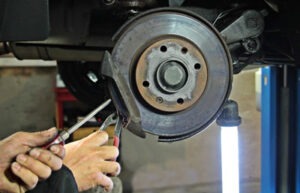
4. Brake Pad Thins
You or your car consultant can manually inspect the brakes and see if it’s thinner than the acceptable size. The varying thickness will determine how often you need to change your car’s brakes. If they are, then it is time for you to replace them with new brakes.
If you are noticing any or all of these symptoms in your car then that might be an indication that it’s time for you to change your brakes and do not hesitate to immediately consult your car’s mechanic to get it fixed.
What To Do next?
When you find symptoms that your car’s brakes are worn out, the first step is of course to take the vehicle to your mechanic. If you know how to fix them on your own or not, you will have to buy the brake pads set on your own, which is the next step. You should make sure that the set is of good quality and is made of good materials and has got all components. You can consult your mechanic, if you trust them, to decide on which set is the best for your car. Do not compromise on the quality of the brakes. After all, there is nothing that matters more than your safety!
How Much Does It Cost To Change The Brakes On Your Car?
The pricing of changing your old brakes to a new one can vary a lot according to the vehicle you are using and its needs. The average cost of a brake pad is about $150 per axle, but this price can go up to $300 per axle depending on the vehicle you are using. The cost will also depend on the material used to manufacture the brakes. For example, brakes made of organic material costs the least while the ones that are made of metal and other ceramic materials are expensive. A complete repair job can cost you up to $200 to $400 on average.

How Do I Have At Least Some Idea When My Brakes Need Evolving?
Signs It’s Time to Replace Your Brake Pads
Squeaking or Squealing Noise Coming From Brakes. The main sign that now is the right time to supplant your brake cushions is assuming you hear relentless squeaking or screeching. …
Pointer Light Turns On. …
Profound Grinding Metal Sound. …
Vibrating Brake Pedal. …
How Long Do Brakes On A Vehicle Endure?
somewhere in the range of 25,000 and 60,000 miles
Most vehicle brakes will endure somewhere in the range of 25,000 and 60,000 miles-somewhere in the range of three and six years for most day to day drivers-however a few sets might endure much longer for the individuals who practice positive routines. Remember, we’re discussing the brake cushions.
What Do New Brakes Cost?
The typical brake cushion substitution costs around $150 per pivot, yet these expenses can ascend to around $300 per hub relying upon your vehicle’s brake cushion materials. The most affordable brake cushions utilize natural materials.
What Amount Do Brakes Cost For A Vehicle?
The sort and brand of brake parts
Contingent upon the kind and brand utilized, a bunch of brake cushions can cost just $20 to upwards of $160. Rotors can likewise shift essentially in quality and cost, with spending plan rotors costing around $60 per hub and more superior brake rotors costing $230 or more.
Conclusion
how often should you change your brakes is more about how you use your brakes and other factors rather than a matter of time. If your car and its brakes start showing any of the symptoms mentioned in this article, you have to realize that you don’t have any more time to hesitate and immediately do the necessary to change your brakes. It’s a matter of safety and you should not compromise anything for that!


